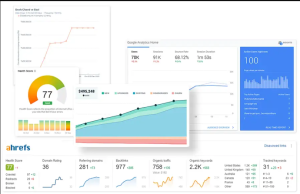Why is On-Page SEO Done? 🚀
In today’s digital era, having a strong online presence is the key 🔑 to success for any business. On-page SEO Optimization is the secret sauce that makes your website visible 📈 and accessible to both search engines and users. But what exactly is on-page SEO, and why is it so important?
What is On-Page SEO? 🤔
On-page SEO involves optimizing individual web pages 🖥️ to rank higher in search engine results (SERPs) and attract relevant traffic. It focuses on both the content and the HTML code behind the page. Unlike off-page SEO, which involves external factors like backlinks, on-page SEO optimization is completely within your control. It’s all about optimizing elements such as content, meta tags, internal links, and URLs, making it easier for search engines 🕵️♂️ to understand your pages and rank them accordingly.
Why is On-Page SEO optimization Done? 💡
1. Boosts Search Engine Rankings 📊
The primary goal of on-page SEO optimization is to improve your website’s visibility on search engines like Google, Bing, and Yahoo. By carefully optimizing your content with relevant keywords, headers, and meta tags, you signal to search engines what your page is about. When search engines understand this, they rank your page higher for relevant queries—bringing in more visitors 🔎. The higher your ranking, the more people will find you!
2. Enhances User Experience (UX) 😍
On-page SEO isn’t just about search engines—it’s about people too! A well-optimized and user-friendly website keeps visitors engaged, encouraging them to explore more. From page speed 🚀 to mobile-friendliness 📱, good SEO makes it easier for users to navigate and find what they need. When users enjoy their experience, they stay longer, reducing bounce rates, and this signals to search engines that your site is valuable.
3. Increases Organic Traffic 🌱
Organic traffic—visitors who find your site through unpaid search results—is the lifeblood 💧 of any successful website. With effective on-page SEO, you can appear at the top of search results, attracting more visitors naturally. Unlike paid traffic, organic traffic is sustainable and cost-effective in the long run. By targeting the right keywords and optimizing for user intent, you’ll bring in a steady stream of potential customers 🎯 who are actively searching for your products or services.
4. Builds Trust and Credibility 🤝
Trust is everything in the online world. A well-optimized website with high-quality content, secure HTTPS protocols, and authoritative outbound links signals to both users and search engines that your site is trustworthy 🛡️. The more credible your site appears, the more likely visitors are to engage, return, and eventually convert into loyal customers 👥.
5. Optimizes for Voice and Mobile Search 📱🎙️
With the rise of voice search (think Alexa and Siri) and the growing number of mobile users, on-page SEO optimization is evolving. Optimizing for natural language phrases and long-tail keywords ensures your site is ready for these modern search trends. Additionally, a mobile-friendly design 📲 ensures you don’t miss out on a huge portion of users who are browsing on-the-go. In fact, Google prioritizes mobile-responsive websites, so optimizing for this can significantly boost your rankings.
6. Aligns Content with Search Intent 🧠
Search intent is the “why” behind a user’s query. Modern SEO focuses on providing content that matches exactly what users are looking for—whether it’s information, a service, or a solution. By aligning your content with search intent, you can attract highly relevant traffic 🔥, which leads to better engagement and conversions. On-page SEO ensures your content satisfies user needs, which helps boost both rankings and user satisfaction.
7. Improves Local SEO 🗺️
For businesses targeting local customers, on-page SEO optimization is crucial to appearing in local search results 🌍. By incorporating local keywords and optimizing your Google My Business listing, you increase your chances of appearing in local searches. For example, when someone searches for “best pizza near me,” your local SEO efforts ensure that your business pops up in those results 🍕—perfect for brick-and-mortar businesses!
8. Helps Search Engines Index Your Site 🕵️♂️
Search engines use bots (crawlers) to scan and index websites. If your site isn’t optimized correctly, these bots may struggle to understand or rank your pages. By improving your site’s structure with clear URLs, sitemaps, and internal linking 🔗, on-page SEO ensures your site is easily crawlable. This helps search engines better index your pages, leading to better rankings.
Key Elements of On-Page SEO 🔍
Let’s break down some of the key elements you need to focus on for successful on-page SEO optimization:
- Title Tags 🏷️: The title tag is the first thing users see in search results. A well-crafted, keyword-rich title can entice more clicks.
- Meta Descriptions 📝: A catchy meta description may not directly impact rankings but does boost click-through rates (CTR), bringing more users to your site.
- Headings (H1, H2, H3) 📑: Clear and structured headings help both users and search engines easily navigate and understand your content.
- Content Optimization ✍️: Creating relevant, keyword-optimized content that addresses user intent is key to driving organic traffic.
- Internal Links 🔗: Linking to other pages on your site enhances navigation and helps search engines crawl your entire website more efficiently.
- Image Optimization 📸: Properly optimized images (alt text, file size) improve page load times and boost rankings, especially in image search.
Conclusion 🎯
On-page SEO is the foundation of any successful digital marketing strategy. Not only does it help search engines understand and rank your content, but it also enhances user experience, driving more traffic, engagement, and conversions 💼. Investing time and effort into optimizing your on-page elements ensures your website is well-positioned to rank higher, attract relevant visitors, and achieve your business goals. 💪
By focusing on these essential SEO techniques, you’re setting the stage for long-term success in the competitive online world. 🌟